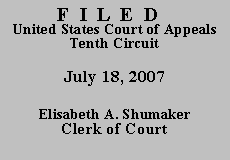

To say that Sean Harrington began this action on September 23, 2005, would be at once perfectly accurate and highly misleading. That is the day Mr. Harrington filed suit in federal district court, listing ten defendants and twenty-eight claims for relief. But in fact, Mr. Harrington's federal suit is only the latest installment in a long-running custody battle for Mr. Harrington's only child, a battle waged largely in Jefferson County, Colorado, District Court over a span of six years. In that time, Mr. Harrington has launched a barrage of motions, actions, and petitions aimed at regaining access to, if not custody of, his daughter, Shelby, which he lost upon his divorce in May 2000. Frustrated at his lack of success in state court, Mr. Harrington brought his campaign to the federal court system nearly two years ago, and has named in his action here defendants ranging from his former wife to the Colorado Attorney General. Most of his claims do not belong in federal court. The rest are without merit.
The district court followed the recommendation of the magistrate judge, dismissing all of Mr. Harrington's claims. To review: The district court found that the Rooker-Feldman doctrine precluded it from considering Mr. Harrington's claims against Madeline Wilson, the attorney for his former wife. See Rooker v. Fidelity Trust Co., 263 U.S. 413 (1923); District of Columbia Court of Appeals v. Feldman, 460 U.S. 462 (1983). Because the state court's adjudication of the custody dispute is not yet final, all other claims against Mr. Harrington's former wife, and Ms. Wilson, the court dismissed as barred by the Younger abstention doctrine. See Younger v. Harris, 401 U.S. 37 (1971). The court ruled Mr. Harrington lacked standing to bring suit against John Gleason and Louise Culberson-Smith, as private citizens may not force state bar officials to discipline member attorneys. Doyle v. Oklahoma Bar Ass'n, 998 F.2d 1559, 1566-67 (10th Cir. 1993).
The plaintiff's remaining claims, suits under 42 U.S.C. § 1983, 1985(3), and 1986 against defendants Gleason and Culberson-Smith, fail for lack of standing. A private citizen, however much aggrieved, has no standing to sue a state bar association for failure to discipline an attorney. Doyle v. Oklahoma Bar Ass'n, 998 F.2d 1559, 1562 (10th Cir. 1993).
The district court went on to provide alternative grounds for dismissal of many of the claims. Plaintiff's § 1983 claims must fail because Mr. Harrington cannot show that Ms. Wilson or his former wife were state actors. Nor can he show they conspired with state actors. See Barnard v. Young, 720 F.2d 1188, 1188-90 (10th Cir. 1983) ("A prerequisite for any relief under [42 U.S.C. ] 1983 is that the defendant has acted under color of state law."). Mr. Harrington's Americans with Disabilities and Rehabilitation Acts claims against the Colorado state defendants do "not adequately alleg[e] that there has been any impediment to [Mr. Harrington's] access to the courts by reason of a disability." As for defendant Laura Arcilise, she is entitled, the district court found, to absolute quasi-judicial immunity for services rendered as the state court judge's division clerk. See Whitesel v. Sengenberger, 222 F.3d 861, 867 (10th Cir. 2000) ("[A]bsolute judicial immunity has been extended to non-judicial officers where their duties had an integral relationship with the judicial process.") (internal quotation marks omitted). Finally, the court concluded that Younger precluded it from granting Mr. Harrington's "Emergency Forthwith Motion for Preliminary Injunction and Sanctions."
The district court erred, however, in dismissing the claims with prejudice. Each of the twenty-eight claims was dismissed on one of three grounds: Rooker-Feldman, Younger abstention, or lack of standing. All three grounds are jurisdictional, and therefore all should result in dismissals without prejudice. Brereton v. Bountiful City Corp., 434 F.3d 1213, 1214 (10th Cir. 2006) ("A longstanding line of cases from this circuit holds that where the district court dismisses an action for lack of jurisdiction, as it did here, the dismissal must be without prejudice."). See also Chapman v. Oklahoma, 472 F.3d 747, 750 (10th Cir. 2006) (addressing Younger); Jackson v. Jackson, 195 F. App'x 745, 745 (10th Cir. 2006) (addressing Rooker-Feldman).
The judgment of the United States District Court for the District of Colorado is AFFIRMED insofar as it dismisses the action. We REMAND to the district court to modify the dismissal to be without prejudice.
Entered for the Court,
Michael W. McConnell
Circuit Judge
*.After examining the briefs and appellate record, this panel has determined unanimously that oral argument would not materially assist in the determination of this appeal. See Fed. R. App. P. 34(a)(2); 10th Cir. R. 34.1(G). This case is therefore submitted without oral argument. This order and judgment is not binding precedent, except under the doctrines of law of the case, res judicata, and collateral estoppel. It may be cited, however, for its persuasive value consistent with Fed. R. App. P. 32.1 and 10th Cir. R. 32.1.